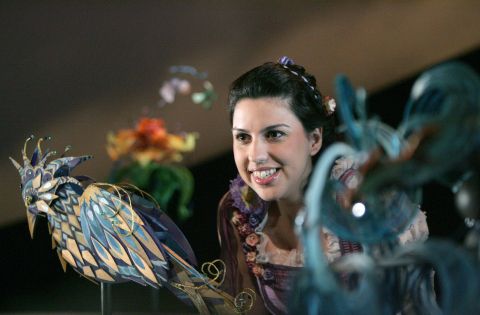|
<< -- 3 -- Robert Hugill AN ENTRANCING EVENING

As Orlando's rival in love, Medoro, Christopher Ainslie was called upon to spend a large part of the time dressed only in a gilt brocade sarong. It says much for Ainslie's sang-froid and competence that he managed to bring this off and dazzle with his singing. Medoro is a lover rather than a knight, so his arias tend to be of the expressive sort rather than martially dramatic. Ainslie responded with shapely singing and convincing dramatic involvement.
That the cast was young was a great help in this production. Ainslie and Rebecca Ryan as Angelica really convinced that they were in love, and Ainslie's scene with Dorinda (Joana Seara), where he has to sympathise with her love for him without actually telling her that he loves another, was very moving. But the high point of Act 1 was the concluding trio, where Angelica and Medoro try and console the love-lorn Dorinda. Memorably staged by Talevi with the three characters constantly circling, this was both a musical and dramatic highlight.
Angelica is the more dramatic of the two soprano parts. Rebecca Ryan was convincing as a lover but projected nobility as well. She combined this with sheer technical brilliance in her more bravura arias.

Joana Seara as Dorinda in the Independent Opera production of Handel's 'Orlando' at the Lilian Bayliss Theatre. Photo © 2006 Alastair Muir
|
Dorinda is perhaps the more appealing character; a shepherdess, hers is the soubrette role but significantly she remains love-lorn throughout the opera and is not paired up with anyone. Joana Seara was appealing and charming and even managed to successfully compete with a group of animated puppets. She managed to combine technical competence with the simplicity of demeanour necessary for this character.
The final character in the opera is the magician Zoroastro, a role written for the great bass Antonio Montagnana. The striking arioso with which Zoroastro opens the opera, where he is contemplating the heavens, was added specifically to utilise Montagnana's talents to the full. Montagnana had a remarkable range and it is to Nicholas Warden's credit that he was able to fulfil the technical requirements of the role. His voice will undoubtedly develop and he will leave this repertoire behind, but currently he is on fine form in this baroque repertoire.
Warden's portrayal of Montagnana had an element of the schoolmaster in it. He played up this slightly comic element in his scene with Angelica and Medoro when he appears out of nowhere and urges Angelic and Medoro to flee.
Continue >>
Copyright © 15 November 2006
Robert Hugill, London UK

| 
